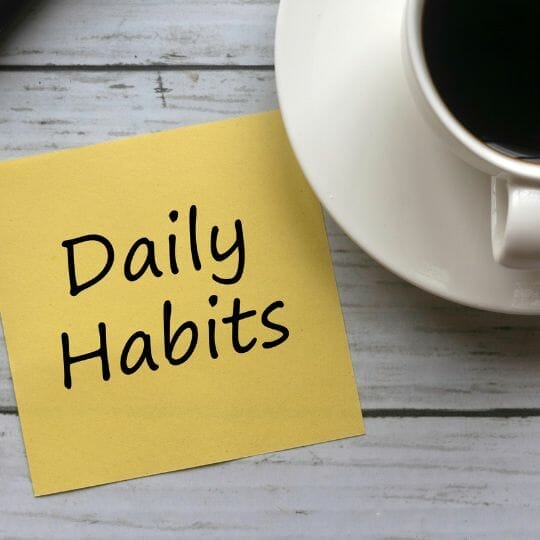
Are you thinking about making a change but lacking in motivation, and wondering how long it will take to form a new habit that happens automatically and effortlessly?
By knowing how long it takes to form a habit, it can help you to manage your expectations, decide if you are ready to start and hang in there long enough to be successful.
I’m sure you know what it’s like. At some point in your life, you have wanted to lose weight, tone up, or establish a better sleep routine, but it can be hard to get started when you’re not clear on how long it will take, and whether you have enough time and energy to even start.
If you search the internet for “how long does it take to form a habit”, you will find a range of answers. Today I want to share the most recent research to answer this question, with caveats included!
To set the scene, let’s look at the architecture of habits. I have done a deep dive on this in previous episodes, so for now, let’s recap.
Firstly, any habit has a cue or trigger – something that causes it to happen.
Then there is a routine or process that you go through.
Then, there is a reward you receive by going through the process.
The craving for this reward can motivate you to keep coming back.
What this means for you is that if you want to change a bad habit or form a new habit, you need to work on the elements of this ‘habit loop’ to help you get there faster.
Let’s look at how to do that, with some examples.
Firstly, consider the type and complexity of the habit that you want to change. Let me give you two examples from my own life so you can see the difference.
If it’s a simple habit you want to form like flossing your teeth once per day, then you can bet that it will happen a lot sooner and become automatic more easily compared to a more complex habit.
A few years ago, a friend of mine told me he had started flossing his teeth each night. This is something I’ve wanted to do for teeth hygiene reasons, but never quite found the motivation and momentum to be consistent. This is probably because I found it to be a rather fiddly and sometimes painful task, and I had told myself that I hated flossing my teeth, or that I couldn’t be bothered.

But as soon as my friend mentioned he was doing this, I decided that I’d have a go too. I didn’t tell him or anyone else – I just decided one day that I would have a competition with myself to do it every night for 12 weeks, as an experiment to see whether I could turn this into an automatic and effortless habit.
The trigger part of the habit was easy – I would floss before brushing my teeth each night. This is called habit stacking, or as I like to call it, piggybacking. I simply put a package of floss next to my toothbrush and voila, I remembered to even think about doing it each night!
I got off to a good start and in the first few weeks, I realised a few things.
Firstly, I realised that each night I was approaching this habit in the wrong way.
When I got ready to floss, I noticed that I was thinking about how annoying this was, or how I didn’t feel like doing it, or how yukky and gross it was – unhelpful thinking! Instead, I decided to come up with more neutral or positive thoughts as I was flossing. I started thinking things like “I did another night! Yay!” or “This is good for my teeth!”
Secondly, I realised that if I was going to be consistent with this, I would have to be clear on the process. I had recently been to a new dentist, and they’d provided some written instructions on how to brush and floss your teeth. To make it more interesting, I decided to geek it up and deep dive into the technique, trying to bring some fresh energy and interest into the process.
I learned about flossing on angles and how long it should take.
Those two things kept me going in the beginning.
Then I started thinking about the reward in earnest, rather than just having that sense of achievement. Sure, that was a reward, but I also ran my tongue over my teeth and made a smug ‘ah’ sound, really celebrating the clean teeth and how I was maintaining the dentist’s good cleaning work.
Something funny happened about 11 or 12 weeks into the routine. I had had a late night and a few drinks and was getting ready for bed. And even being so tired, I realised that I simply couldn’t go to bed without flossing my teeth before brushing.
It was a huge win! I could celebrate more than just the fact that it had become automatic and effortless – I also wanted to floss my teeth because I had created an attachment to the rewards of achievement and cleaner teeth (as opposed to the old rewards of getting out of a boring task).
Now compare that with something like giving up smoking. Smoking is something you do multiple times per day, and your desire to smoke might be triggered by multiple different things.
I smoked socially in my late teens, and in earnest when I was 21 years old after a stressful series of events. It had become a coping mechanism and a way of fitting in socially (these were the rewards).

After a year, I decided it was ridiculous to smoke and I wanted to give up but it was difficult! This wasn’t just one habit loop – it was many habit loops happening in tandem.
For example, there were various cues or triggers for smoking.
After breakfast. While driving. After lunch. When stressed. While hanging out with certain friends. While drinking alcohol. At a pub or nightclub (a common hangout when I was this age). At the end of the day as a pleasant wind-down ritual on the balcony of my unit. Looking cool in front of boys (or so I thought).
Coupled with the perceived rewards of coping better and looking cool (yes, I am groaning about these), I also had a serious nicotine addiction by now so had chemical drivers.
This habit was a lot more complex than teeth flossing!
In the end, I dismantled my smoking habit one piece at a time.
Firstly, I switched from menthol cigarettes (which tasted better) to plain cigarettes and the worst-tasting ones – in other words I made the habit more unpleasant.
Next, I substituted those cigarettes for ones that tasted bad AND had the lowest nicotine.
Then, I started delaying my first cigarette. So instead of around 9am, I would wait until 10am, then 11am, then after lunch.
By now I was smoking fewer per day, so I started buying smaller packets.
I started hanging out with different friends – friends who didn’t smoke. This was a game changer for this habit because it removed temptation and also helped me frame a healthier identity – by hanging around people who placed a higher value on health.
I was going to nightclubs to dance instead of smoking. I was going to the beach in the daytime instead of pubs to play pool.
By the end of about 6 months, I was down to one cigarette per day – the one on the balcony late afternoon. This was the hardest one to give up because I had a positive ritual and feeling of me time. However, I made the decision to stop and do something else at this time.
Voila, the habit was gone.
I had cravings for a while, but it was easier to ride them out once I got this far.
As you can see, more complex habits take longer to break or form and are more involved.
Some people go for substitution for gum or other things, but for me, I wanted to break the habit and rewire all the different areas of my life rather than swap one vice or habit for another.
Complexity aside, I think a lot comes down to the type of person you are.
If you are motivated, focused, achievement-oriented and proactive, it’s probably easier for you to form a new habit or break a bad habit.
Some people have more addictive personalities – and I am one of these (as revealed in a genetic test I had done a few years ago to look at disease risk factors).
Some people like putting others first and even at their own expense, which can get in the way of forming new habits.
These are all factors that affect your ability to form new habits and the time that it takes.

Your life situation impacts your ability to form a habit and the rate at which it happens.
Why? Because making change is hard. It requires a lot of focus and energy from your brain, and brains like taking the easy, low-cost, low-effort route.
That means if your life situation is busy, overwhelming, stressful, painful, difficult, or involving major shifts or even crises, forming a new habit is going to be pretty difficult. Not just in terms of starting but in persisting.
The best time to form a new habit is when there’s little stress in your life when things are on an even keel, and when there aren’t many other pressures in life.
This is not always possible, but at least you can clear the decks to make time and energy to focus on doing something new, or something different.
The less stress you have, I believe the faster and easier change will be.
This is where working with a coach can be so helpful because they help you make the time and create the focus, and clear the decks so that you have enough brain power to form a habit.
And not too many at once!
Finally, your mindset is a critical piece of the puzzle.
You heard me say earlier in the teeth flossing and quit smoking examples, that I had decided to do it. And after 13 years of coaching, I can say that the majority of my clients use similar words.
They say that they have decided, or they are in the right headspace, or they are really ready. There is determination in those words.
And to be successful and persist for long enough so that you can form and automate a habit, you need to have a good enough reason that is meaningful to you because this is your motivator to keep going.
I’ve just given you a lot of backstory about habit formation that sets the scene for discussing the research.
A 2009 paper by Phillippa Lalley et. al. was published in the European Journal of Social Psychology.
The study involved 96 volunteers over 12 weeks. Those volunteers chose an eating, drinking or activity behaviour to carry out daily in the same context (e.g. after breakfast).
The time it took to form the habit and for it to become largely automatic was 18 – 254 days, with an average of 66 days (9.5 weeks). A huge range!
It is known that behaviour is likely to become habitual when it is frequently and consistently performed in the same context, this study found that a habit could be formed and become automatic even if it was missed a few times.
More recently, a longitudinal field study considered how self-control capacity affected the development of habits over a period of 90 days.
Contrary to expectations, self-control capacity did not seem to affect the habit formation process and opened the opportunity for future research.
The recent research reveals a few keys to easier and potentially faster habit formation and habit automaticity:
To me, these findings back up my experience with my own habits and with clients.
The recipe for success seems to lie in the goal-setting process and the situation, as described earlier.
If you clear your decks to make time, set specific goals around behaviours that are rewarding, and commit to doing them frequently, you will more likely succeed.
Having the support of a coach will probably help you get there faster!
Today we talked about how long it takes to form a habit and covered some of the factors that influence the timing and ease of habit formation.
There is a lot of scope for future research in this area, with the most recent studies having shown that your capacity for self-control is not critical to the process!
Rather, the intrinsic reward, frequency of behaviour, commitment, environment and in my experience, situation, mindset and personality, might all play a role in the timing.
Lally, P., van Jaarsveld, C.H.M., Potts, H.W.W. and Wardle, J. (2010), How are habits formed: Modelling habit formation in the real world. Eur. J. Soc. Psychol., 40: 998-1009. https://doi.org/10.1002/ejsp.674
van der Weiden Anouk, Benjamins Jeroen, Gillebaart Marleen, Ybema Jan Fekke, de Ridder Denise. (2020). How to Form Good Habits? A Longitudinal Field Study on the Role of Self-Control in Habit Formation. Frontiers in Psychology 11. URL=https://www.frontiersin.org/articles/10.3389/fpsyg.2020.00560
Understanding who you are and what you need will allow your business to thrive! If you’re truly ready to break old habits and get out of the rut I encourage you to check out the Habitology membership.
Learn more here:
© 2024 Melanie White